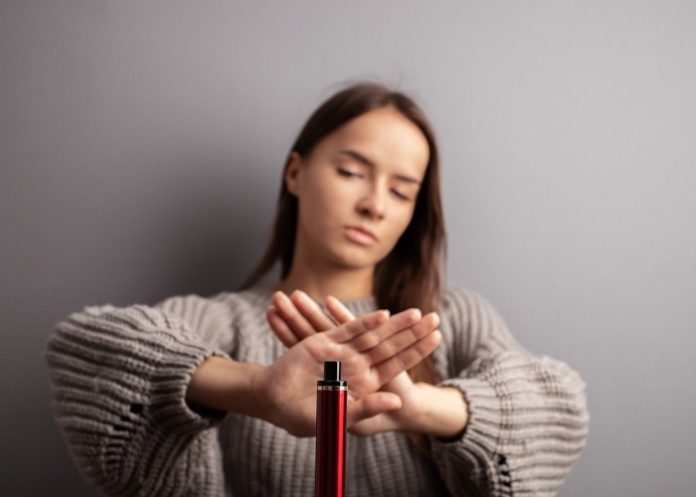A recent clinical trial showed that teens and young adults who took varenicline – an FDA-approved, twice-daily smoking cessation pill for adults – are more than three times as likely to successfully quit vaping than those who received only behavioural counselling.
“Vaping is extremely popular among kids, and we know that this early nicotine exposure can make drugs like cocaine more addictive down the line, yet ours is the first treatment study to look at this vulnerable population,” said lead author Eden Evins, MD, MPH, director of the Centre for Addiction Medicine at Massachusetts General Hospital (MGH).
MedicalXpress reports that about a quarter of 18-to-25-year-olds vaped in 2023, and roughly 8% of high-schoolers in the US vaped in 2024.
However, vapes have been found to contain many of the same familiar health threats as cigarettes, like nicotine addiction, carcinogen and heavy metal exposure, as well as pulmonary inflammation. Exploring treatment plans is crucial to provide teens and young adults with safe, effective avenues to quit.
To identify such a treatment avenue, the Mass General Brigham team recruited 261 participants aged 16-to-25 into a randomised clinical trial. Participants were sorted into three treatment groups. The first was varenicline, weekly behavioural counselling, and access to a free text support service called “This is Quitting”.
The second was placebo pills, weekly behavioural counseling, and the text service. The third was the text service alone. Each group was treated for 12 weeks, then checked monthly for another 12 weeks’ post-treatment.
Each week, participants reported whether they had successfully quit vaping, and their responses were verified with cotinine saliva tests. At the end of 12 weeks of treatment and at three-months of follow-up, the varenicline group had the highest quitting success rate.
At 12 weeks, 51% of varenicline users had stopped vaping, compared with 14% of placebo users and 6% of text-only users. At 24 weeks, 28% of varenicline users had stopped vaping, compared with 7% of placebo users and 4% of text-only users.
These findings demonstrate the importance of medication to help young people who are addicted to nicotine to quit vaping, since the varenicline group had three times more success quitting vaping than their placebo counterparts – despite both engaging in behavioural therapy.
Further research is needed to explore the potential impact of other therapeutic approaches, as well as to look at even younger people who use nicotine vapes.
Because varenicline is already approved for smoking cessation in adults, it can be prescribed for anyone aged 16 to 25 wanting to quit nicotine vaping.
“Not only was varenicline effective in this age group, it was safe. Crucially, we didn’t see any participants who quit vaping turn to cigarettes,” said Randi Schuster, Ph.D., founding director of the Centre for School Behavioural Health at MGH.
Study details
Varenicline for youth nicotine vaping cessation: a randomised clinical trial
Eden Evins, Corinne Cather, Harrison T. Reeder et al.
Published in JAMA Network on 23 April 2025
Abstract
Importance
Electronic cigarette use (vaping) among adolescents and young adults is common. Few treatments have been tested in this population.
Objective
To evaluate the efficacy of varenicline for nicotine vaping cessation in youth who do not smoke tobacco regularly.
Design, Setting, and Participants
A three-group randomised clinical trial compared 12 weeks of double-blind varenicline vs placebo, each added to brief, remotely delivered behavioural counselling and compared with single-blind enhanced usual care, with monthly follow-up to 24 weeks. The trial was conducted among youth, aged 16 to 25 years, who vaped nicotine daily or near daily, did not regularly smoke tobacco, and wanted to reduce or quit vaping, in a single US state from June 2022 to May 2024. Data collection ended May 28, 2024.
Interventions
Participants were randomised (1:1:1) to 12 weeks of varenicline titrated to 1 mg twice daily over 7 days (standard titration), weekly counseling, and referral to text messaging vaping cessation support (This is Quitting [TIQ]) (n = 88); identical placebo, weekly counselling, and referral to TIQ (n = 87); or enhanced usual care (referral to TIQ only) (n = 86).
Main Outcomes and Measures
Biochemically verified continuous vaping abstinence for the last 4 weeks of varenicline treatment vs placebo (primary outcome). Secondary outcomes included bioverified continuous abstinence from weeks 9 through 24 in the varenicline and placebo groups. Additional analyses compared varenicline group and placebo group with enhanced usual care.
Results
Of 261 randomised participants (mean age, 21.4 years; 53% female), 254 completed the trial (97.3%). For varenicline and placebo, continuous abstinence rates were 51% vs 14% during weeks 9 through 12 (adjusted odds ratio [aOR], 6.5 [95% CI, 3.0-14.1]; P < .001) and 28% vs 7% during weeks 9 through 24 (aOR, 6.0 [95% CI, 2.1-16.9]; P < .001). Varenicline had higher continuous abstinence rates vs enhanced usual care during weeks 9 through 12 (51% vs 6%; aOR, 16.9 [95% CI, 6.2-46.3]) and during weeks 9 through 24 (28% vs 4%; aOR, 11.0 [95% CI, 3.1-38.8]). Continuous abstinence rates were not significantly different between the placebo and enhanced usual care groups. Study medication was generally well tolerated. Two varenicline participants (2%) and 1 placebo participant (1%) discontinued study medications due to adverse events. No drug-related serious adverse events occurred. Treatment-emergent adverse events were reported by 76 (86%) in the varenicline group, 68 (79%) in the placebo group, and 68 (79%) in the enhanced usual care group.
Conclusions and Relevance
Varenicline, combined with behavioural counselling, increased vaping abstinence in youth who vape nicotine and do not regularly smoke tobacco.
See more from MedicalBrief archives:
No neuro-psychiatric risk with varenicline
Call for ‘watershed’ Surgeon-General’s report on vaping
Varenicline helps smokers quit gradual

